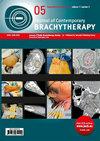Dosimetric impact of applying a model-based dose calculation algorithm for skin cancer brachytherapy (interventional radiotherapy)
IF 1.1
4区 医学
Q4 ONCOLOGY
引用次数: 0
Abstract
Purpose:Brachytherapy (BT, interventional radiotherapy) is a well-established radiotherapy technique capable of delivering high doses to tumors while sparing organs at risk (OARs). Currently, the clinically accepted dose calculation algorithm used is TG-43. In the TG-186 report, new model-based dose calculation algorithms (MBDCA), such as Elekta’s advanced collapsed cone engine (ACE), have been introduced, although their clinical application is yet to be fully realized. This study aimed to investigate two aspects of TG-186: firstly, a comparison of dose distributions calculated with TG-43 and TG-186 for skin tumors; and secondly, an exploration of the impact of using a water bolus on the coverage of clinical target volume (CTV) and OARs.
Material and methods:
Ten treatment plans for high-dose-rate IRT were developed. All plans were initially calculated using the TG-43 algorithm, and were subsequently re-calculated with TG-186. In addition, one of the treatment plans was assessed with both TG-43 and TG-186, using 10 different water bolus thicknesses ranging from 0 to 5 cm. To assess dose variations, the following dose-volume histogram (DVH) parameters were compared: D2cc and D0.01cc for OARs, and V150, V100, V95 and V90 for CTV coverage.
Results and conclusions:
The average dosimetric results for CTV and OARs, as calculated by both algorithms, revealed statistically significant lower values for TG-186 when compared with TG-43. The presence of a bolus was observed to enhance CTV coverage for the TG-186 algorithm, with a bolus thickness of 2 cm being the point at which ACE calculations matched those of TG-43. This study identified significant differences in dosimetric parameters for skin tumors when comparing the TG-43 and TG-186 algorithms. Moreover, it was demonstrated that the inclusion of a water bolus increased CTV coverage in TG-186 calculations.
对皮肤癌近距离放射治疗(介入放射治疗)采用基于模型的剂量计算算法的剂量学影响
目的:近距离放射治疗(BT,介入放射治疗)是一种成熟的放射治疗技术,能够向肿瘤提供高剂量,同时保护危险器官(OAR)。目前,临床上使用的剂量计算算法是 TG-43。在TG-186报告中,引入了新的基于模型的剂量计算算法(MBDCA),如Elekta先进的塌缩锥引擎(ACE),但其临床应用尚未完全实现。本研究旨在研究 TG-186 的两个方面:首先,比较用 TG-43 和 TG-186 计算的皮肤肿瘤剂量分布;其次,探讨使用水栓对临床靶体积 (CTV) 和 OAR 覆盖率的影响。所有计划最初都是用 TG-43 算法计算的,随后用 TG-186 重新计算。此外,还同时使用 TG-43 和 TG-186 对其中一个治疗方案进行了评估,使用的水栓厚度从 0 厘米到 5 厘米不等,共 10 种。为了评估剂量变化,对以下剂量-体积直方图(DVH)参数进行了比较:结果和结论:两种算法计算出的 CTV 和 OAR 平均剂量测定结果显示,TG-186 的数值在统计学上明显低于 TG-43。在 TG-186 算法中,栓剂的存在提高了 CTV 的覆盖率,栓剂厚度为 2 厘米时,ACE 的计算结果与 TG-43 相匹配。这项研究发现,在比较 TG-43 和 TG-186 算法时,皮肤肿瘤的剂量学参数存在明显差异。此外,研究还表明,在 TG-186 计算中,水栓的加入增加了 CTV 的覆盖范围。
本文章由计算机程序翻译,如有差异,请以英文原文为准。
求助全文
约1分钟内获得全文
求助全文
来源期刊

Journal of Contemporary Brachytherapy
ONCOLOGY-RADIOLOGY, NUCLEAR MEDICINE & MEDICAL IMAGING
CiteScore
2.40
自引率
14.30%
发文量
54
审稿时长
16 weeks
期刊介绍:
The “Journal of Contemporary Brachytherapy” is an international and multidisciplinary journal that will publish papers of original research as well as reviews of articles. Main subjects of the journal include: clinical brachytherapy, combined modality treatment, advances in radiobiology, hyperthermia and tumour biology, as well as physical aspects relevant to brachytherapy, particularly in the field of imaging, dosimetry and radiation therapy planning. Original contributions will include experimental studies of combined modality treatment, tumor sensitization and normal tissue protection, molecular radiation biology, and clinical investigations of cancer treatment in brachytherapy. Another field of interest will be the educational part of the journal.
 求助内容:
求助内容: 应助结果提醒方式:
应助结果提醒方式:


